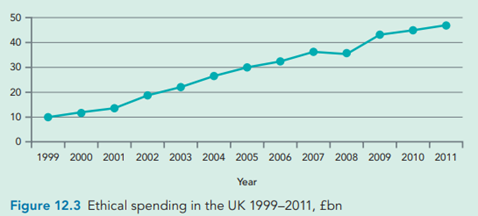dolution
dolution.
ETHICAL CONSUMERS
By Jeff Bray, Waitrose Fellow of Retailing, Bournemouth University
Save your time - order a paper!
Get your paper written from scratch within the tight deadline. Our service is a reliable solution to all your troubles. Place an order on any task and we will take care of it. You won’t have to worry about the quality and deadlines
Order Paper NowWhile most of this chapter focuses on the actions of retailers, it is widely acknowledged that their customers often take a keen interest in ethical considerations. In some cases customers will direct their purchasing towards those product brands and retailers that are believed to operate in the most ethical manner, and in other cases customers actively avoid (boycott) brands that are thought to behave in an unethical manner.
Since 1999, the Co-operative bank has conducted a significant annual audit of ethical consumer spending in the UK. The resulting reports highlight very clearly how consumer interest in ethical concerns is steadily growing as highlighted in Figure 12.3. Based on this data it is clear that retailers not only have a moral obligation to act responsibly, but that it is also increasingly likely to be in their commercial interest garnering greater support from customers.
The ‘ethical consumer’ is one who considers the working conditions of producers and suppliers, andis mindful of the environmental impacts of purchases. Their purchasing decisions can be positive in specifically selecting to purchase through a retailer that is believed to uphold high ethical standards, or purchase products that are specifically denoted as ‘fair trade’ or ‘organic’, both recognised standards that assure the fair treatment of workers and environmental consideration in the sourcing and processing of products; or negative through the ‘boycotting’ of specific brands or retailers due to their perceived negative ethical stance. In the UK it is clear that all of these behaviours are growing in importance with sales of fair trade items increasing from £33m in 2000 to £1.3bn in 2011; sales of organic products increasing from £605m in 2000 to £1.5bn in 2011, and the effect of boycotting increasing from £773m in 2000 to £1.7bn in 2011 ( Co-operative Bank, 2012).
In spite of these rather convincing growth statistics, it is clear that not all consumers are equally concerned

about ethical considerations. Significant academic attention has been devoted to trying to understand which consumers are most likely to select ethical products, however different studies often produce conflicting results such that we still lack a clear understanding of consumer behaviour in this regard. What is clear however is that many more customers claim to care about ethical issues than actually purchase according to these principles. This has become known as the 30:3 phenomenon in which roughly 30Ă‚Â per cent of all consumers claim to care about the kind of ethical issues relevant to product purchase, and yet in most cases ethical products have failed to achieve market shares in excess of 3 per cent (Cowe and Williams 2000).
A number of studies have examined why these ‘conscientious’ consumers are not translating their good intentions into purchasing actions and have found that price constraints, lack of choice and a lack of information are all impeding sales (Bray et al., 2011) suggesting that there are significant further opportunities for market growth in this area as retailers develop their strategies.
"Looking for a Similar Assignment? Get Expert Help at an Amazing Discount!"

